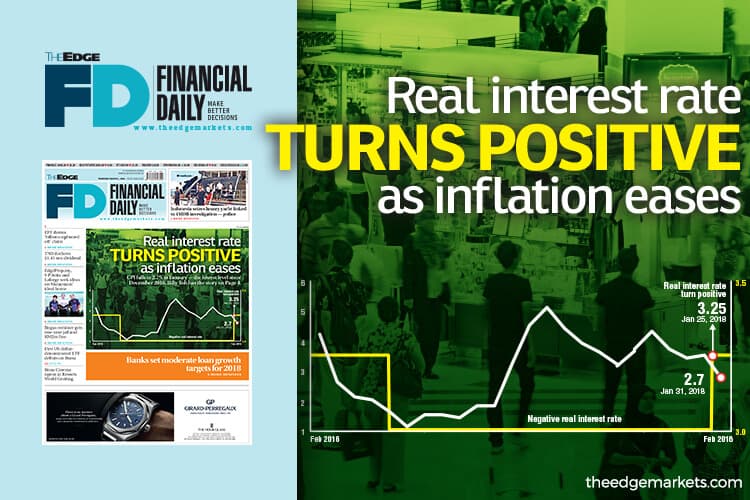
This article first appeared in The Edge Financial Daily on March 1, 2018
KUALA LUMPUR: Fixed deposits in the banks will be yielding a positive real return should inflation remain below 3%. The country’s real interest rate turned positive as the Consumer Price Index (CPI) softened to 2.7% year-on-year in January — the lowest level since December 2016.
January’s figure is below the market estimate of 2.8%.
With the moderation seen in the headline inflation and the 25 basis points hike in the overnight policy rate (OPR) to 3.25% in January, it means the interest earned from bank savings is sufficient to hedge against inflation.
The real interest rate was in the negative for almost the whole of 2017 when the inflation rate stayed above 3%.
The country’s average inflation rate in 2017 was approximately 3.9%, and it has never gone lower than 3.2%. Last year, the highest inflation rate was at 5.1% in March before a slight moderation seen after September.
Most of the banks offered fixed deposit rates from 2.9% to about 4.15%.
The latest headline inflation number affirmed most economists’ view on inflation to moderate in 2018, considering the high-base effect in the first quarter.
Affin Hwang Investment Bank Bhd chief economist Alan Tan told The Edge Financial Daily that the real interest rate in the country is likely to turn positive, looking at the expected average inflation rate of about 3% this year compared with 3.9% last year.
“I don’t think we can just look at a single point when we talk about the real interest rate but in our view, the average inflation rate would be at about 3% for the full year, slightly lower than the 3.9% seen in 2017. And assuming the OPR rate remains at [the] current level, we will be seeing a positive real interest rate,” Tan said.
He attributes the lower inflation rate to two underlying factors — the retail petrol price which has moderated compared with a year ago, and lower prices of imported products as the ringgit has strengthened compared with the exchange rate a year ago.
The ringgit was trading at about RM4.4285 against the US dollar at the end of January last year, significantly lower than at RM3.8985 on Jan 31 this year. Currently, the ringgit is at RM3.917 against the greenback.
For Tan, the headline inflation would hover at about the 2.75% level in the first half of the year (1H18) before trending higher to about 3.25% in 2H18 as the brent crude oil price is expected to move slightly higher during that period.
“With the oil price expected to trend higher in the second half, inflation is expected to move upwards. Of course, it will not be the same as what we have seen in 2017 as the lower base effect is no longer there after the oil price recovery seen last year,” he added.
Tan expects the brent crude oil to average at about US$65 (RM255.45) to US$68 per barrel in 2018, with an upside surprise of US$70 per barrel a possibility. As of writing, the brent crude oil is trading at US$66.48 per barrel.
Julia Goh, senior vice-president in global economics and market research at UOB Malaysia, concurs that in 2018, inflation is expected to ebb amid high-base effects. The January inflation headline number was below Goh’s expected 3%.
“Noteworthy, there were revisions to [the] CPI weights in January. Prominent revisions were noted in the transportation component due to higher weights for fuel and lubricant, and repair and maintenance.
“The services weight was revised upwards while food and non-alcoholic beverage weight was revised downwards due to lower weights for food at home. All in, this does not change our outlook for slower inflation of 2.5% in 2018,” Goh said in a note.
She pointed out the upside risks will depend on oil and commodity prices, utility cost adjustment, domestic wage growth and the ringgit.
“We expect [the] headline CPI inflation to fall further to around 1.7% year-on-year in February and March because of fuel price cuts and base effects, before rebounding in April when the base effect reverses. We see slight downside risks to our full-year inflation forecast of 3.2% from recent fuel price cuts,” wrote Nomura Global Markets Research economist Euben Paracuelles in his research note yesterday.
Goh and Paracuelles expect no OPR hike in the remaining year.
“The window of rate hikes is also closing, as we expect the [14th] general election to be called sometime in late April or early May, followed by a tight fiscal policy in the second half of 2018 to meet the government’s full-year fiscal deficit.
“We remain comfortable with our call of Bank Negara Malaysia to leave OPR unchanged at 3.25% for the rest of the year which we believe was intended more to reduce the pace of policy accommodation and prevent a build-up of financial imbalance risks,” Paracuelles said.